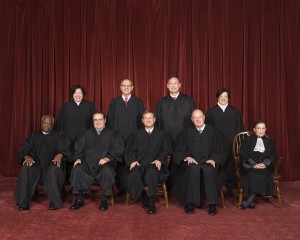This is a question only lawyers can love. Feel free to skip to Question #2 if you like. If you're still with me, start by going 140 years back in time to the 1867 Tax Anti-Junction Act. No, I'm not making this up--it's the crux of this first question before the Supreme Court. Here's the deal: the ACA requires that people purchase health insurance or pay a penalty. Many people say this "penalty" is a tax in disguise. The Tax Anti-Injunction Act bars people from suing over a tax until they actually pay the tax. Since the ACA goes into full effect in 2014, no penalties will be paid until 2015. And so, 2015 would be the soonest someone who paid the tax could challenge the constitutionality of the ACA. Will the Supreme Court punt and say, "Come back in 2015"? Court-watchers say that's unlikely. SPECIAL NOTE: If you can only pay attention to two of the three days of hearings, this is your day to skip.
Update: The Supreme Court determined it had the authority to rule.
2. Is the Individual Mandate Constitutional?
Oral arguments Tuesday, March 27, 7-9am PT
Of the four questions the Supreme Court is considering, this is the big one. As you learned in Question #1, the ACA requires all Americans to purchase health insurance or pay a penalty/tax. If your annual income is below a certain level--about $92,000 for a family of four-- the government will provide subsidies or tax credits to help you. But the mandate is unpopular. Just over half of Americans think the Supreme Court should declare the mandate unconstitutional, while 28 percent think it should stay. The primary legal question is this: does Congress have the authority under the Commerce Clause of the U.S. Constitution to require Americans to purchase a product, in this case health insurance? Those in favor say yes--Congress can both regulate interstate commerce and legislate taxes. Those opposed say this is the first time Congress has required Americans to purchase a product and it's unconstitutional. SPECIAL NOTE: if your employer provides health insurance or if you are a Medicare recipient, nothing about your personal situation will change. On January 1, 2014, you would continue to receive the same employer-based coverage or Medicare.
Update: In a 5-4 ruling, the Supreme Court determined that the individual mandate is constitutional.
3. If the Individual Mandate is Unconstitutional, Can the Rest of the ACA Go Forward?
Oral arguments Wednesday, March 28, 7-8:30am PT
Severability. This word will be all over the news next Wednesday. Why? Suppose the Supreme Court decides the individual mandate is unconstitutional. Can the mandate be "severed" from the ACA, allowing the ACA to stand? This question has a bit of unusual background: normally when Congress writes a law, it includes a "severability" clause, so that if one part of a law is struck down, the rest of the law can still stand. Back in the last days of drafting the ACA, the House version indeed had a severability clause. The Senate side expected to add it in a conference committee. But things got so hectic at the end, there was never a conference committee and the severability clause was not part of the final law. SPECIAL NOTE: many experts think severability is implied. They say if the individual mandate is struck down, the rest of the law can stand. Only the Supreme Court will say for sure.
Update: The question of “severability” became irrelevant since the Supreme Court determined that the individual mandate is constitutional.
4. Is the Medicaid Expansion Constitutional?
Oral arguments Wednesday, March 28, 10-11am PT
Medicaid is the health care plan for the poor and disabled that is run by individual states with both state and federal dollars. The Affordable Care Act expands those eligible for Medicaid to adults earning 133 percent of the federal poverty level. But in order for states to continue receiving any federal money for Medicaid, the ACA requires them to comply with this expansion. Twenty-six states who have challenged this requirement say withholding all monies for Medicaid is coercive and therefore unconstitutional. Those states which support the expansion--including California--say that Congress can constitutionally attach such conditions under what's known as the "Spending Clause." SPECIAL NOTE: Congress has expanded Medicaid many times in the past and never had an expansion struck down.
Update: The Supreme Court ruled 5-4 that Congress may not take away all funds for Medicaid if a state decides not to expand the program. As of January 2013, many states have determined to go forward with the expansion; the federal government will pay 100 percent of the costs of any newly eligible enrollees for the first three years and not less than 90 percent of the cost thereafter. Other states have said they will not expand the program; Congress must continue to fund a state's existing Medicaid program at the existing level.
Some final thoughts:
The Supreme Court's decisions are expected in late June, possibly early July.
Update: as noted, the decisions came down June 28, 2012.
The Court will make audio recordings available following the end of arguments each day, but turned down requests for live TV or radio broadcasts.
Update: Oral arguments and transcripts on the Medicaid expansion and individual mandate.
While some elements of the Affordable Care Act have already gone into effect, the major components of the legislation take effect on January 1, 2014.
Learn More:
Background on the Individual Mandate: Court Weighs Making Health Coverage a Fact of Life (AP)
A Guide to the Supreme Court’s Review of the 2010 Health Care Reform Law [PDF] (Kaiser Family Foundation)
